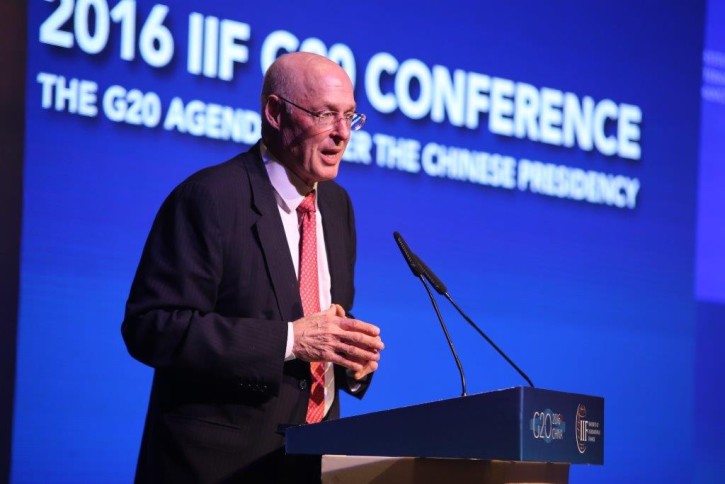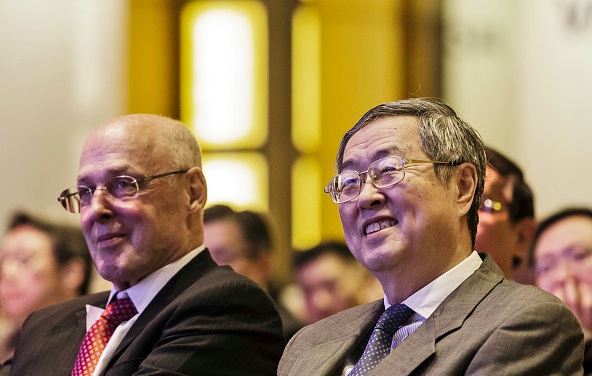
Paulson Institute Chairman Henry M. Paulson, Jr., delivered the following remarks today at the Institute for International Finance G20 Conference in Shanghai:
Let me first extend my congratulations to China for its leadership of the G20 and its willingness to tackle some of the most pressing issues facing the global economy today. As global growth slows, and uncertainty and volatility plague the world’s financial markets, it is critically important to see coordinated G20 action to address these and other concerns.

In 2008, when I was in office the G20 was elevated to include heads of state in an effort to better develop a coordinated response to the financial crisis. But to ensure that the G20 remains relevant amid rapidly changing global economic and financial conditions, it will need to adapt to changing circumstances. Macroeconomic policy coordination will always be important. But the G20 also needs an agenda that reflects current conditions and concerns in the global economy. This year, coming out of the Paris climate summit, there is a heightened interest in the potential of green finance. And that is just the kind of adaptive agenda that will help make the G20 a robust and successful addition to the architecture of global economic governance.
Chinese Economy
For China, the host, there will be an intensified level of interest—and scrutiny. And this comes at a moment when China is wrestling with bouts of market turbulence and serious questions from market participants about the future of China’s economy.
My own view is as follows:
Markets react to volatility everywhere. And quite frankly, China’s sheer size and the scope of the issues it faces mean that any vulnerability here will be magnified. It should surprise none of us, therefore, that markets are so sensitive to what has been happening here in China.
The fact is, China faces short, medium, and long-term challenges that are both real and difficult. In the short term, the principal challenges include currency, overcapacity, and the need to quickly restore market confidence. In the medium term, China must address the buildup of debt and leverage across the system. Over the longer term, the Chinese economy needs more sustainable new growth drivers—indeed, making these structural adjustments lies at the heart of President Xi Jinping’s reform agenda.
But the good news, I believe, is that a very large part of the answer to all three of these challenges—short, medium, and long—is, in some sense, similar: Because the immediate market concerns about currency are, in no small sense, a proxy for broader concerns about China’s economy. Taking meaningful steps to advance the reform agenda would both move China on the path to a new growth model and signal markets that the country is serious about dealing with current challenges. Bluntly put, China should double down on reforms, and soon.
From where I sit, there are three areas, in particular, where China could demonstrate seriousness of purpose and sensitivity to market concerns, while also moving its economy down the path to deepened structural reform in the bargain:
First, China could take significant and visible steps to show that it is serious about dealing with underperforming and inefficient state-owned enterprises. One such step would be to dramatically reduce overcapacity in sectors such as steel and coal. China should let some of these and other failing state-owned concerns actually fail. That means dealing with them not through consolidation but by allowing bankruptcies.
A second area where China could take especially meaningful steps now would be through demand-side fiscal and tax policies. These should include business tax cuts to stimulate the private sector and encourage innovation, as well as programs to further encourage household consumption.
China can also judiciously leverage supply-side fiscal tools to support the transition from inefficient legacy industries to new growth sectors. As China seeks to “make the market decisive,” doing so in a way that bolsters private sector firms will be an important signal of intent. This too would help to support President Xi’s underlying strategy of rebalancing the Chinese economy.
In terms of the immediate question of the currency, China needs to deal with both a substantive and the messaging challenge. On substance, I believe China remains committed to moving toward a flexible and market-driven exchange rate regime. But stability is important today, when speculative pressures and market sentiment are to the down side and confidence and understanding are low.
I do not believe it is wise or prudent to opine on the renminbi until market participants have a better understanding of the state of the Chinese economy and how the Chinese are planning to deal with it. They know as well as anyone what the downsides and trade-offs are. They are always adapting and learning.
And importantly, I believe the markets need to see the current volatility in a broader context in China and globally. China’s economy is still growing at above 6%, and the biggest risks for China—and by extension the rest of the world—are probably in the future and can be avoided if China pursues the right demand and supply side fiscal policies to deal with the immediate challenges, while accelerating President Xi’s economic reform agenda. China has the necessary tools and capacity to do so. Now, it is a matter of political will.
Green Finance
Coming out of the recent climate change summit in Paris, China has also made green finance a new G20 priority. This has the potential to open up a huge new market for environmental goods and services in China and the rest of the world as well.
To make true progress on climate change, we need new financing models to attract the large amounts of private capital necessary to fully fund clean technology initiatives. Because governments do not have the money necessary to finance this effort, they need to create the conditions to attract private capital.
Developing countries in particular will be stretched to fund environmental cleanup and advance the development of clean technology while also addressing the need for continued growth. But green finance will also bring benefits, creating new and more sustainable sources of prosperity. And as is so often the case where progress depends on upfront investment, finance holds the key.
Green finance should not be another form of aid that wealthy nations will provide to poorer countries. Nor can it just be state-backed project financing in disguise. Instead, the focus should be on harnessing market principles to draw in private capital so that clean technologies can be commercialized and financing shifted away from polluting industries that rely on environmental destruction without paying for it.
The required transformation in the financial system will not be easy. It will take strong leadership from those involved in the G20. China’s presidency is, therefore, well timed, given the leadership role that China has taken on green finance. It has put forward proposals to align its financial system with low-carbon growth. It has called for the creation of new lending institutions with specific environmental objectives, which would lower the funding cost for green projects. And it has launched a major reform proposal for its financial system to include green bonds, green indices, disclosure requirements and more. It is even attempting to put a price on carbon through the planned creation of a nationwide carbon market in 2017.
These are all positive steps. But there is much more that the G20 countries can be doing together to encourage the appropriate and efficient allocation of capital to support the transition to sustainable economic growth.
The issue is not that capital is scarce. It is rather that abundant capital needs to be encouraged by the right policies and market incentives to seek out low-carbon sectors that can also generate new sources of economic growth and create new jobs. This is an ideal situation for public private cooperation.
The opportunity to deploy private capital for these purposes is enormous. In China, for example, buildings account for nearly 40 percent of China’s total energy consumption. If we are able to finance construction of more energy efficient buildings—and the Paulson Institute is working with the Chinese government as well as U.S. and Chinese firms on an initiative to do just this—we can have a significant impact on carbon emissions.
As financial leaders, you have the talent, expertise and ability to develop the innovative financial products necessary to help governments meet their commitment to reduce greenhouse gases and promote green growth.
Humanity will swell by another 2 or 3 billion people in the coming decades — and most of this population increase will be absorbed by cities. Many of the countries that will see urban population growth are developing ones, which lack proper municipal finance systems to fund urban development. The public sector has a lot of work to do here too.
Public spending should aim to punch above its weight by harnessing private capital to every dollar spent. Government policies can also speed the change in financing and investment practices.
Green finance and policy choices will differ across nations. Some will opt to put a price on carbon, as China is doing. Some will open for combinations of taxes and subsidies – and regulation.
The G20 countries will have an opportunity to make a significant impact by adopting policies and new green financing concepts that will promote allocation of capital to low-carbon sectors and thus generate new sources of economic growth and create new jobs.
I am optimistic, particularly given the effectiveness of leaders like Governor Zhou Xiaochuan and Governor Mark Carney on this issue, both good friends, that they can move the ball significantly forward during China’s presidency of the G20, especially with the support of all of you.


